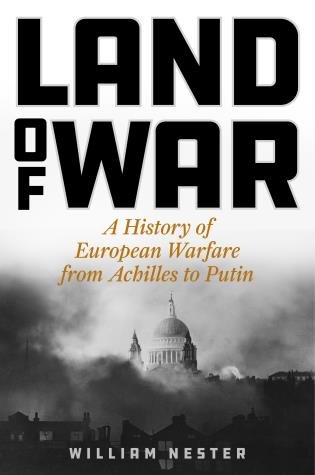Land of War by William Nester
/Land of War: A History of European Warfare from Achilles to Putin
By William Nester
Stackpole Books 2023
If an author produces a history of the entire course of European warfare in under 500 pages, opens it with the Clausewitz quote about war being a continuation of politics by other means, and ends things by airily wondering if Europeans will ever again go to war with each other, readers have every right to roll their eyes a bit. A book like Land of War: A History of European Warfare from Achilles to Putin by William Nester (Professor at St. John’s University in Queens, New York) seems designed to launch immediately into the special pleading of lowered expectations. Since the book’s stated remit is impossible (any one of the wars from Achilles to Putin could fill 500 pages – Homer wrote an entire epic about just one of those wars), this special pleading goes, we’ll a priori excuse the book from actually doing what it claims and instead start asking what it does instead.
By taking a perspective that’s usually high-altitude enough to be in low orbit, Nester very adroitly manages a rapid-fire university-style rapid-fire tour of Western warfare. After the requisite Clausewitz quote, he takes readers rapid-marching through chapters with titles like “Greeks and Romans,” “Popes and Kings,” “Renaissance and Reformation,” and so on, each chapter averaging around 40 pages – long enough to present broad outlines, nowhere near long enough to get into any kind of detailed analysis. Nester has frequent occasions to toss off quips of questionable accuracy – things like “Battles during the Middle Ages were as rare as sieges were common” – and often displays a talent for compression that’s dazzling:
For the next five years, the Peninsular War followed a pattern. The French launched late spring offensives. Wellington staved them off and then advanced farther eastward, usually inflicting twice as many casualties as he suffered. Napoleon funneled a steady stream of troops to Spain but did not resume command there. Instead, he spent most of the next two and a half years governing his empire.
He descends to discussions of individual fighting forces, as when he contends that “man for man, perhaps no other people had tougher, fiercer warriors than Vikings” (they were toughened up by all that rowing, crossfit fans will want to know), and he persistently raises questions about the oddity of our own contemporary history, in which the end of the Second World War seemed to usher in an extremely rare pause in large-scale conventional warfare on European soil. “For seven decades after 1945, Europeans managed to avoid wars and limit rebellions, riots, and terrorism among themselves even as some European states fought in wars elsewhere around the world,” he writes, asking, “In the coming decades and beyond, will Europeans keep that peace or once again war against each other?”
Nester knows perfectly well that many inhabitants of Europe would raise eyebrows at the implied contention that they’ve been at peace since 1945; his commentary about the depravations of Vladimir Putin’s territorial aggression is all the more biting for being so brief. But as an overview of this enormous subject, a place-marker on the path to much more in-depth treatments (very much including some of Nester’s own earlier excellent books), Land of War covers its many horrors with genuinely thought-provoking economy.
Steve Donoghue is a founding editor of Open Letters Monthly. His book criticism has appeared in The Washington Post, The American Conservative, The Spectator, The Wall Street Journal, The National, and the Daily Star. He writes regularly for The Boston Globe, the Vineyard Gazette, and the Christian Science Monitor and is the Books editor of Georgia’s Big Canoe News.
